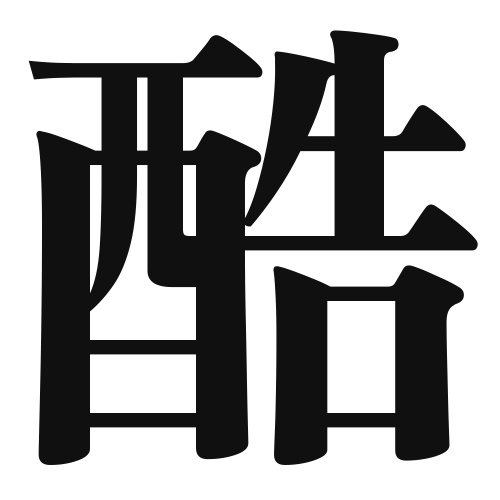1. Overview of Meaning
The kanji “酷” (koku) means “severe,” “harsh,” or “cruel.” It is often used to describe extreme conditions or actions that are intense and difficult to endure.
2. Formation and Radical
Formation of the Kanji: The kanji “酷” is a phonetic compound (形声文字), which combines the radical for “water” (氵) and the phonetic component “ku” (酷). The water radical often relates to emotions or conditions, enhancing the meaning of severity.
Radical: The radical of “酷” is 氵, which is related to water and often signifies fluidity or conditions that can be harsh.
3. Examples of Usage
Common Words and Phrases:
- 酷暑 (こくしょ) – “intense heat”
- 酷評 (こくひょう) – “harsh criticism”
Example Sentences in Daily Conversation:
- この夏は酷暑が続いています。 (This summer has been marked by intense heat.)
- 彼の映画は酷評されました。 (His movie received harsh criticism.)
4. Synonyms and Antonyms
Similar Kanji:
- 厳しい (きびしい) – “strict” or “severe,” but often used in a more formal or disciplinary context.
- 過酷 (かこく) – “extreme” or “harsh,” often used to describe conditions that are difficult to bear.
Antonyms:
- 優しい (やさしい) – “gentle” or “kind,” which conveys a sense of softness and compassion.
- 穏やか (おだやか) – “calm” or “gentle,” indicating a peaceful and mild nature.
5. Cultural and Historical Background
Relation to Japanese Culture: The concept of “酷” is often reflected in Japanese literature and art, where the harshness of nature or human emotions is explored. It can symbolize the struggles faced in life.
Proverbs and Idioms:
- 「酷な現実」 (こくなげんじつ) – “harsh reality,” often used to describe situations that are difficult to accept.
- 「酷使」 (こくし) – “overuse,” referring to the excessive use of resources or efforts.
